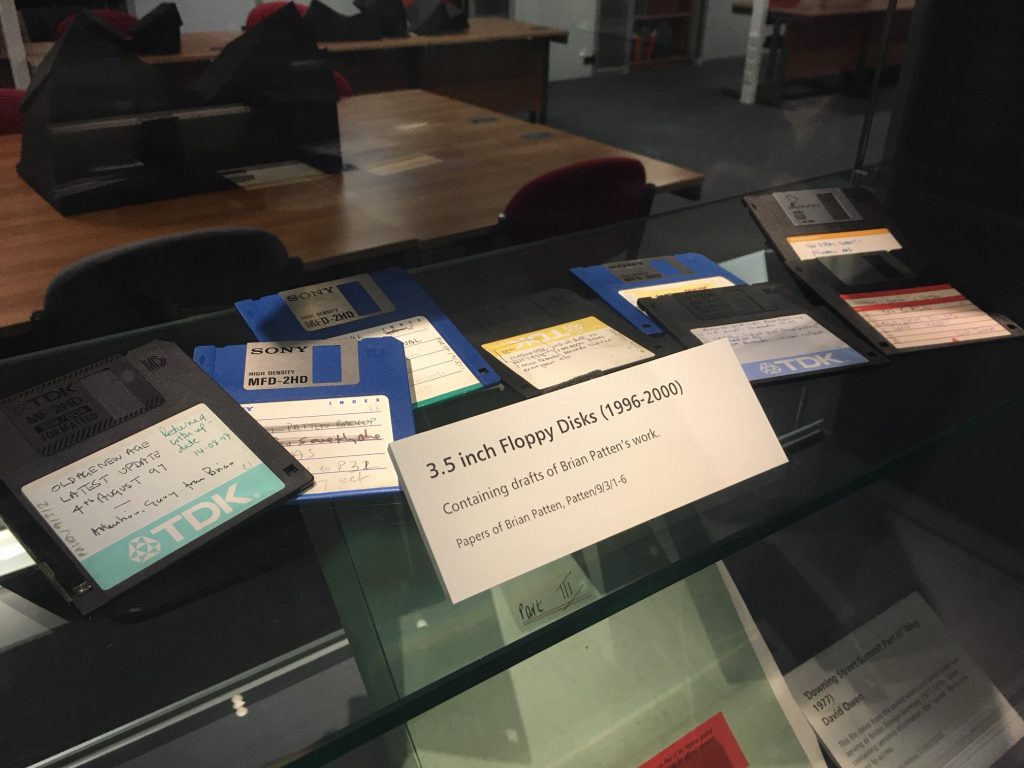Did you know that the University of Liverpool is an associate member of the Digital Preservation Coalition? A not-for-profit membership organisation, the DPC exists to enable members to deliver resilient long-term access to digital content and services, ensuring our digital legacy for future generations.
As Special Collections & Archives continues to collect material of research value, inevitably some of this material is in digital form. This includes the records of the University, as well as emails and drafts of correspondence in deposited collections. Anyone who remembers floppy discs and other obsolete formats knows technology moves on and content becomes inaccessible. This will inevitably happen with the digital files in common use today. SCA needs to work to ensure its digital archives remain accessible for the long-term.

Digital preservation issues also particularly effect our colleagues in Records Management and Research Data Management, though they are relevant to anyone who relies on digital content being accessible over time.
Both students and staff can create a DPC account and access the all the useful resources available, including the comprehensive Digital Preservation Handbook, a toolkit, plus blogs and templates.
Students and staff can also benefit form the training and conferences that take place each year, and bursaries are often available.
Our colleague Meada Wadman, who works in Records Management and is currently studying for her masters at LUCAS, recently went on the DPC’s Novice to Know-How training. Her impressions are below:
Novice to Know-How digital preservation training: What I learnt by Meada Wadman
Although ‘digital preservation’ is an increasingly familiar phrase, it was an area where I had limited understanding or experience. So, when the opportunity arose to complete the Novice to Know-How training, I felt like the ideal candidate and jumped at the chance to take part.
Novice to Know-How was certainly a comprehensive introduction to digital preservation, and I was very impressed with the breadth of information that I covered. I took modules exploring digital preservation models, advocacy, how digital files are composed and why they need to be preserved, the DPC’s Rapid Assessment Model and how to set up an ingest station, amongst others. Altogether it was an impressive amount to fit into a course with an estimated completion time of two days!
One highlight for me was the simple description of how digital files are composed. We are all so used to creating and using electronic records, but I had very little knowledge of how these files are ‘built’. Worse, I had assumed that the answers would be incredibly complex and challenging for the layman to understand. In fact, Novice to Know-How provided simple explanations aided by easy-to-follow diagrams, and helped me to develop a much stronger understanding of how binary digits become bytes and then files that are translated into the content we see on our computer screens. Finally grasping these basics really helped me to understand how digital files can become unreadable and why we need digital preservation, as well as how some common digital preservation techniques work.
And the value of the training didn’t just end with learning the nuts and bolts of digital preservation. Rather, I was very pleased to find out about how I can continue to develop my understanding of digital preservation in my current job.
The module explaining the DPC’s Rapid Assessment Model was a helpful introduction to one of digital preservation steps that my manager and colleagues across the Information Governance teams at the University are currently completing. At the same time, the course also provided useful advice for effectively advocating for the importance of digital preservation, and I’m hoping to be able to use some of this, in my role working on the Records Management team’s communications. For a start, I’ll be including a feature on digital preservation and the value of the University’s membership to the Digital Preservation Coalition in this month’s RM newsletter.
Contrary to my initial concerns, I learnt that I’m not the only one who’s felt a bit apprehensive about digital preservation. I was very glad that the training emphasised that small steps and a commitment to ongoing involvement with digital preservation is a more effective strategy than one mammoth effort. An unexpected, but especially nice, topic covered in the training was the wealth of resources and network of support available for digital preservation. I now know that there a many experts willing to share their knowledge and friendly groups of professionals working towards implementing digital preservation strategies who I can learn from.
Altogether, the digital preservation training was a brilliant introduction to a topic that is very important to all of us and I’m looking forward to building on what I’ve learnt!